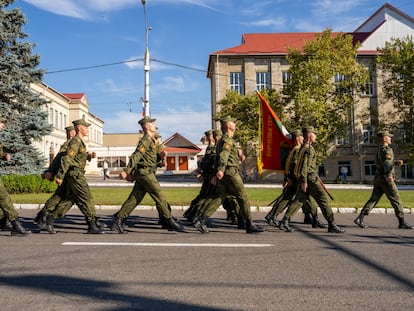Pro-Russian separatists in Transnistria, a possible new front for Moldova and Ukraine
A dissident politician believes a congress of deputies in the secessionist Moldovan region will request incorporation into the Russian Federation this week

The secessionist region of Transnistria, internationally recognized as part of Moldova, could add new tension to Russia’s war in Ukraine. A congress of deputies from all local administrative levels has been convened for February 28 in the capital, Tiraspol. The secessionists have previously resorted to this meeting format only on significant occasions, starting with their unilateral declaration of independence in 1990.
According to Ghenadie Ciorba, a dissident politician from Transnistria, the congress will turn to Russia to ask it to welcome the region into its territory. Such a request, if confirmed, would reiterate the appeal that the Transnistrian authorities made in 2006 following a referendum in which, according to them, 97% of the population voted in favor of integration into Russia, despite not sharing a common border. Russia did not recognize the referendum and, to date, has not recognized Transnistria as a state either.
Sources consulted in Tiraspol and in Chisinau, the Moldovan capital, believed the congress will be limited to propagandistic and provocative gestures towards both Moldova and Ukraine. Moscow, they stress, cannot provide support to Transnistria or access to that territory without first conquering the Ukrainian city of Odesa. President Vladimir Putin has on occasion referred to the large Black Sea port as a “Russian city.”
“Odesa, come home,” former Russian president Dmitry Medvedev recently said. “We have been waiting for Odesa in the Russian Federation because of the history of this city, what kind of people live there, what language they speak. It is our Russian, Russian city.”
“The Russians do not have the capacity to conquer Odesa now, so they’d better leave us alone and we will welcome them when they come,” sources in Tiraspol responded ironically.
Vadim Krasnoselsky, the president of Transnistria and the official driving force behind the congress, has so far avoided involving the region in the war in Ukraine and has even blocked initiatives supporting the Russian cause from the left bank of the Dniester River, the sources in Tiraspol point out. Moreover, Krasnoselsky recently received the Ukrainian ambassador to Moldova, to whom he offered help in transporting Ukrainian grain blocked by Russia. The Ukrainian representative expressed the desire to reopen the Kyiv consulate in the Transnistria region within the framework of the Ukrainian representation in Moldova.
“If Russia recognizes us and includes us in its territory we would become a legal target for Ukraine, as are Belgorod and other border regions of western Russia,” adds a source from Tiraspol, according to whom the February 28 congress seems more in line with Russian interests than those of Transnistria and its inhabitants.
In calling for the meeting, Krasnoselsky alleged “pressure from Moldova” that “violates the rights and worsens the socio-economic situation of the inhabitants of Transnistria,” in reference to new Moldovan customs regulations whereby international trade from Transnistria (whose industry also exports to the EU) has lost tax privileges it obtained from Chisinau as part of a policy of seduction to reintegrate the separatist region. Transnistria’s international trade activity is now conducted on equal terms with the rest of Moldovan trade. Regular contacts continue to take place between Moldovan and Transnistrian representatives under the umbrella of a dialogue platform of which Russia has been a member, along with the European Union and the Organization for Security and Co-operation in Europe (OSCE).
Lack of recognition
In 2022, Moscow recognized the self-styled “people’s republics” of Donetsk and Luhansk as states and used their requests for help as a pretext to invade Ukraine. The next step was to incorporate the occupied territories into the Russian Federation by means of pseudo-referendums. In the case of Transnistria, there is neither recognition as a state nor of borders by Moscow.
The convening of the congress could be a response to Moscow’s need to keep Moldova — a candidate country for incorporation into the European Union — in check, and in the same process initiated by Kyiv that the Kremlin tried so hard to prevent. Transnistria is mostly located between the left bank of the Dniester River and Ukraine. The war has greatly hampered communications and impaired trade and labor migration from Transnistria to Russia.
Since Moldovan citizens have been able to move freely within the European Union the inhabitants of Transnistria have taken advantage and have learned to value Moldovan passports. Transnistrians also look for Romanian ancestry to obtain passports from Bucharest.
Populated mainly by Russian and Ukrainian Slavs and pro-Russian Moldovans, Transnistria, whose actual population is now estimated to be fewer than 500,000 inhabitants, broke away from Moldova in 1990 in response to the pro-Romanian policy practiced at the time by the leaders of the then-Soviet republic. After armed clashes in July 1992, the leaders of Moldova, Transnistria, and Russia — Mircea Snegur, Igor Smirnov, and Boris Yeltsin — reached agreements which, with fluctuations, have kept the situation stabilized on the ground, where a contingent of around 1,600 Russian soldiers is stationed with limited capabilities for action. Moldova is demanding the withdrawal of this contingent, which is guarding important Soviet-era munitions dumps. In 1999, Russia pledged to remove the ammunition, but that promise was not kept. Over time, the state of the ammunition has deteriorated and with it the military presence, due to difficulties in personnel rotations.
Sign up for our weekly newsletter to get more English-language news coverage from EL PAÍS USA Edition
Tu suscripción se está usando en otro dispositivo
¿Quieres añadir otro usuario a tu suscripción?
Si continúas leyendo en este dispositivo, no se podrá leer en el otro.
FlechaTu suscripción se está usando en otro dispositivo y solo puedes acceder a EL PAÍS desde un dispositivo a la vez.
Si quieres compartir tu cuenta, cambia tu suscripción a la modalidad Premium, así podrás añadir otro usuario. Cada uno accederá con su propia cuenta de email, lo que os permitirá personalizar vuestra experiencia en EL PAÍS.
¿Tienes una suscripción de empresa? Accede aquí para contratar más cuentas.
En el caso de no saber quién está usando tu cuenta, te recomendamos cambiar tu contraseña aquí.
Si decides continuar compartiendo tu cuenta, este mensaje se mostrará en tu dispositivo y en el de la otra persona que está usando tu cuenta de forma indefinida, afectando a tu experiencia de lectura. Puedes consultar aquí los términos y condiciones de la suscripción digital.









































